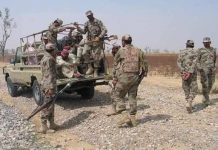Khalil Baloch, Chairman of the Baloch National Movement, has expressed concern over Brahumdagh Bugti’s statement on March 27, saying that the statement is tantamount to distorting the Baloch political history.
Brahumdagh Bugti, the President of Baloch Republican Party, has written on Twitter that “Baloch Republican Party rejects 27 March as occupation of #Balochistan”.
In a series of tweet he said, “Therefore, it is completely wrong to call Kalat’s forceful annexation with Pakistan as occupation of entire Balochistan and calling for its restoration is equivalent to dividing Balochistan into several states & tribal areas (which were not part of Kalat). It is not acceptable.”
Responding to Brahumdagh Bugti’s tweets, Khalil Baloch tweeted, “It’s for the first time in the last 70 years that a Baloch nationalist is trying to undermine Pakistan’s occupation of Balochistan. It’s paramount to shaming Shaheed Akbar Bugti’s legacy.”
Khalil Baloch said that Baloch Republican Party has been observing 27th March as black day for last many years, but now they made a paradigm shift all of a sudden. “Who has taught them this new lesson of 70 years old history?”
He said the evidence of Balochistan’s forcible occupation by Pakistan are well documented in the books written by Inayatullah Baloch, Taj Mohammad Breseeg and Mohammad Hassan Hussain Burr.
“Kalat state was not a province; rather, it was the official name of Balochistan. Whereas, Makkuran, Kharan and Lasbela were provinces of the Kalat state. The provinces had no legal or constitutional right to annex with Pakistan. Makkuran was under direct control of the Kalat state and a governor appointed by Kalat conducted the affairs of Makkuran. Nawab Bahiyan Khan, the sardar of Makkuran, had taken oath as the member of upper chamber (Aiwan e Bala) of the Kalat State parliament; he also participated in several meetings of the assembly. It was Makkuran’s governor, Prince Abdul Karim, who led the first rebellion immediately after Pakistani occupation of Balochistan. “
Khalil Baloch said Balochistan had its own parliament, and its lower and upper houses both rejected the annexation. “Ghaus Bakhsh Bezanjo, Gul Khan Naseer and other representatives from all over Balochistan uniformly rejected the idea of annexation with Pakistan”.
He regretted that the twisting of historical facts from a nationalist leader is an attempt to divert the direction of the national struggle. “Such a move might please Pakistan but Baloch nation would never allow anyone to distort the political history of Baloch nation.”
Khalil Baloch questioned Brahumdagh Bugti’s fluctuating political stand. “From his statement about unconditional negotiations with Pakistan to the negation of forcible occupation of Balochistan indicates that Brahumdagh Bugti is not only parting ways with the Baloch struggle, but also attempting to uproot it.”






























